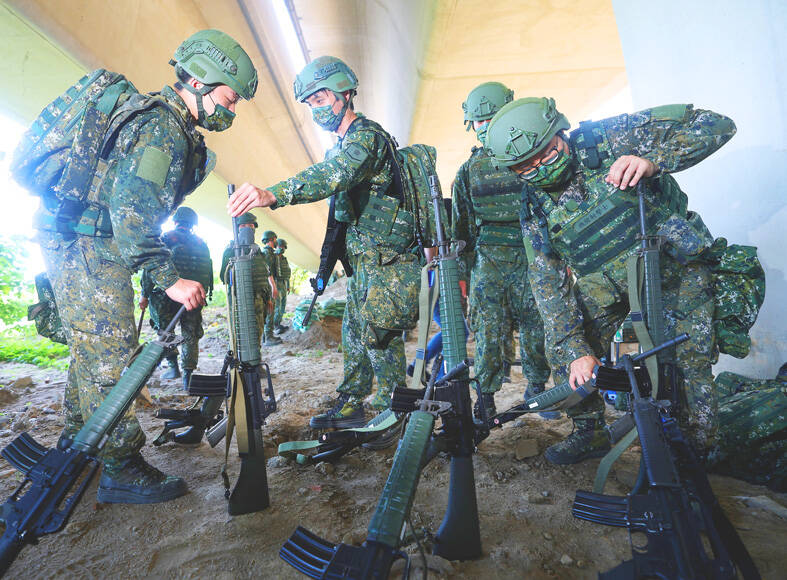The dual-track reservist training program is continuing next year, with 7,000 more reservists required to take part in the more intensive two-week training regimen that began earlier this year, the Ministry of National Defense said in a report yesterday.
Under the program, some reservists undergo two weeks of intensive training twice in eight years, rather than the existing five-to-seven-day regimen four times every eight years, with the aim of improving the combat readiness of Taiwan’s reserve forces.
The two-week regimen, which was launched in March as a trial, is far more physically demanding than the five-to-seven-day regimen and participants spend more time honing their combat skills, including shooting.

Photo: CNA
This year, about 15,000 reservists from across the nation took part in the two-week course, while 97,000 were trained under the five-to-seven-day regimen.
Next year, 22,000 reservists would be sent on the two-week course, which would continue as an expanded trial, while about 97,000 reservists would still complete the old training, the ministry in a report sent to lawmakers for review.
The test results of reservists who participated in the more intensive training regimen this year showed an improvement in their marksmanship, the ministry said.
This year, 13.7 percent of those who took part in shooting tests after undergoing the two-week training passed, compared with only 5.9 percent a year earlier, it said, adding that this was because they underwent 28 hours of shooting practice instead of only 12 hours in previous years.
Of the reservists taking part in the two-week training this year, 9.5 percent passed their combat tests, up from only 5.5 percent the previous year, because they were able to train for up to 56 hours instead of only 12 hours during the five-to-seven-day training, the ministry said.
Regardless of the length of their training, from next year, reservists would undergo training at designated “strategic locations” throughout the country instead of at training camps or military bases as they do now, the ministry said.
Doing so is meant to familiarize them with the locations and buildings they would be assigned to defend in the event that war breaks out, it added.

Taiwan has received more than US$70 million in royalties as of the end of last year from developing the F-16V jet as countries worldwide purchase or upgrade to this popular model, government and military officials said on Saturday. Taiwan funded the development of the F-16V jet and ended up the sole investor as other countries withdrew from the program. Now the F-16V is increasingly popular and countries must pay Taiwan a percentage in royalties when they purchase new F-16V aircraft or upgrade older F-16 models. The next five years are expected to be the peak for these royalties, with Taiwan potentially earning

STAY IN YOUR LANE: As the US and Israel attack Iran, the ministry has warned China not to overstep by including Taiwanese citizens in its evacuation orders The Ministry of Foreign Affairs (MOFA) yesterday rebuked a statement by China’s embassy in Israel that it would evacuate Taiwanese holders of Chinese travel documents from Israel amid the latter’s escalating conflict with Iran. Tensions have risen across the Middle East in the wake of US and Israeli airstrikes on Iran beginning Saturday. China subsequently issued an evacuation notice for its citizens. In a news release, the Chinese embassy in Israel said holders of “Taiwan compatriot permits (台胞證)” issued to Taiwanese nationals by Chinese authorities for travel to China — could register for evacuation to Egypt. In Taipei, the ministry yesterday said Taiwan

Taiwan is awaiting official notification from the US regarding the status of the Agreement on Reciprocal Trade (ART) after the US Supreme Court ruled US President Donald Trump's global tariffs unconstitutional. Speaking to reporters before a legislative hearing today, Premier Cho Jung-tai (卓榮泰) said that Taiwan's negotiation team remains focused on ensuring that the bilateral trade deal remains intact despite the legal challenge to Trump's tariff policy. "The US has pledged to notify its trade partners once the subsequent administrative and legal processes are finalized, and that certainly includes Taiwan," Cho said when asked about opposition parties’ doubts that the ART was

If China chose to invade Taiwan tomorrow, it would only have to sever three undersea fiber-optic cable clusters to cause a data blackout, Jason Hsu (許毓仁), a senior fellow at the Hudson Institute and former Chinese Nationalist Party (KMT) legislator, told a US security panel yesterday. In a Taiwan contingency, cable disruption would be one of the earliest preinvasion actions and the signal that escalation had begun, he said, adding that Taiwan’s current cable repair capabilities are insufficient. The US-China Economic and Security Review Commission (USCC) yesterday held a hearing on US-China Competition Under the Sea, with Hsu speaking on